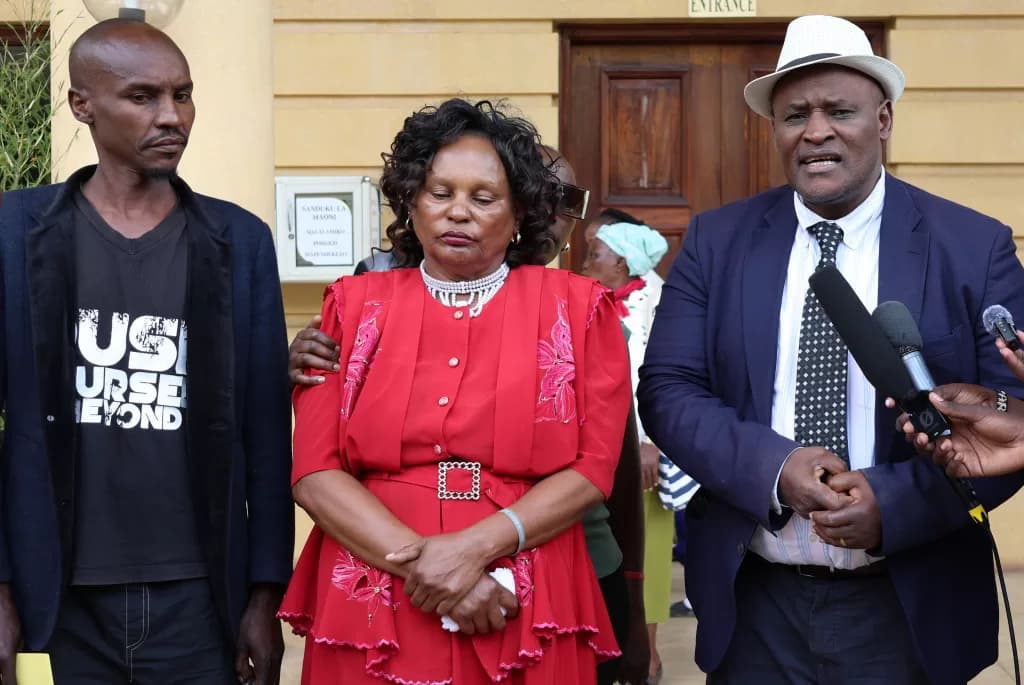We're loading the full news article for you. This includes the article content, images, author information, and related articles.
The family of security analyst Mwenda Mbijiwe has moved to the High Court, seeking to compel the government to produce him, dead or alive, four years after his mysterious disappearance in June 2021.

The family of Mwenda Mbijiwe, a prominent security analyst and former Kenya Air Force officer, has filed an urgent application at the Milimani High Court in Nairobi. They are seeking orders to compel the Inspector General of Police, the Director of Criminal Investigations (DCI), and other security agencies to either produce Mbijiwe in court, dead or alive, or release him unconditionally from what they describe as unlawful custody.
Mbijiwe's mother, Jane Gatwiri M'Ithinji, stated in an affidavit that her son was allegedly abducted on Saturday, June 12, 2021, in the Roysambu area of Nairobi while en route to Meru County. She claims he was taken by men believed to be plainclothes security officers driving an unmarked vehicle.
The family's lawyer, Evans Ondieki, argues that Mbijiwe's continued disappearance violates his constitutional rights to liberty, health, and freedom of movement. The High Court, on Tuesday, October 14, 2025, summoned the Director of Public Prosecutions (DPP) Renson Ingonga and Inspector General of Police Douglas Kanja to appear in court on Wednesday, October 15, 2025, to explain Mbijiwe's whereabouts.
Mwenda Mbijiwe was a well-known figure, frequently appearing on Kenyan television as a security analyst and consultant. He previously served as an Air Defence Control Unit commander in the Kenya Air Force, leaving in 2007 to establish his security consultancy agency, Eye on Security. In 2017, he unsuccessfully vied for the Meru gubernatorial seat.
Prior to his disappearance, Mbijiwe had reportedly received death threats, which he filed at the Central Police Station under OB number 75/16/06/2021. His last public appearance was during a radio interview on Muuga FM on Thursday, June 10, 2021, where he discussed national security matters.
The car Mbijiwe was driving, a hired white Toyota Fielder, was found abandoned in a coffee plantation near Tatu City, Kiambu County, on Sunday, June 13, 2021, the day after he was reported missing. Reports also indicate that Mbijiwe disappeared alongside Mathew Muhatia Namasaka, a man with several court cases, including a robbery with violence charge, who was reportedly Mbijiwe's driver and bouncer.
Kenya's legal framework currently lacks explicit legislation defining or criminalising enforced disappearances, making prosecution challenging. While the country signed the International Convention for the Protection of All Persons from Enforced Disappearances (ICPPED) on February 6, 2006, it has yet to ratify it. Human rights organisations, including Missing Voices, have consistently advocated for the enactment of a law that criminalises enforced disappearances and provides for accountability and reparations for victims and their families.
The government has acknowledged a lack of official statistics on abductions and enforced disappearances. Interior Cabinet Secretary Kipchumba Murkomen stated in May 2025 that only 13 cases of missing persons had been reported to the police since the beginning of the year. However, human rights groups present significantly higher figures. Missing Voices documented 55 cases of enforced disappearances in 2024 alone, a 450 percent increase from 2023, attributing the surge to periods of political unrest. The Kenya National Commission on Human Rights (KNCHR) reported 82 cases of abductions since June 2024, with 29 individuals still missing as of December 2024.
Mwenda Mbijiwe's mother, Jane Gatwiri M'Ithinji, has expressed profound emotional and psychological distress over her son's disappearance. She stated that the family has searched for him in police stations, hospitals, prisons, and mortuaries without success, placing her last hope in the court.
Human rights organisations, such as Missing Voices and the KNCHR, have consistently raised concerns about the rising number of enforced disappearances in Kenya, particularly those involving government critics and activists. These groups allege that state security agencies are often implicated in such disappearances, a claim the police generally deny while stating they are investigating.
The continued prevalence of enforced disappearances poses significant risks to human rights and the rule of law in Kenya. It fosters a climate of fear and impunity, undermining public trust in state institutions. The lack of a specific law criminalising enforced disappearances further complicates efforts to seek justice for victims and their families. International observers and human rights groups have repeatedly urged Kenya to ratify the ICPPED to strengthen its legal framework and ensure accountability.
The exact circumstances surrounding Mwenda Mbijiwe's disappearance remain unknown. While his family alleges abduction by security officers, the government has not officially confirmed his detention or whereabouts. The discovery of his hired car abandoned, and the later activity on his WhatsApp groups in October 2021, where he reportedly left several groups, have only deepened the mystery. The alleged disappearance alongside Mathew Muhatia Namasaka, a man with a criminal record, adds another layer of complexity to the case.
The High Court's proceedings on Wednesday, October 15, 2025, will be crucial in determining the immediate next steps in the search for Mwenda Mbijiwe. The appearance of the DPP and IG is highly anticipated, as their statements could shed light on the government's knowledge of Mbijiwe's whereabouts. The case is expected to intensify calls from human rights organisations for greater transparency and accountability in cases of enforced disappearances in Kenya.
Keep the conversation in one place—threads here stay linked to the story and in the forums.
Sign in to start a discussion
Start a conversation about this story and keep it linked here.
Other hot threads
E-sports and Gaming Community in Kenya
Active 9 months ago
The Role of Technology in Modern Agriculture (AgriTech)
Active 9 months ago
Popular Recreational Activities Across Counties
Active 9 months ago
Investing in Youth Sports Development Programs
Active 9 months ago
Key figures and persons of interest featured in this article